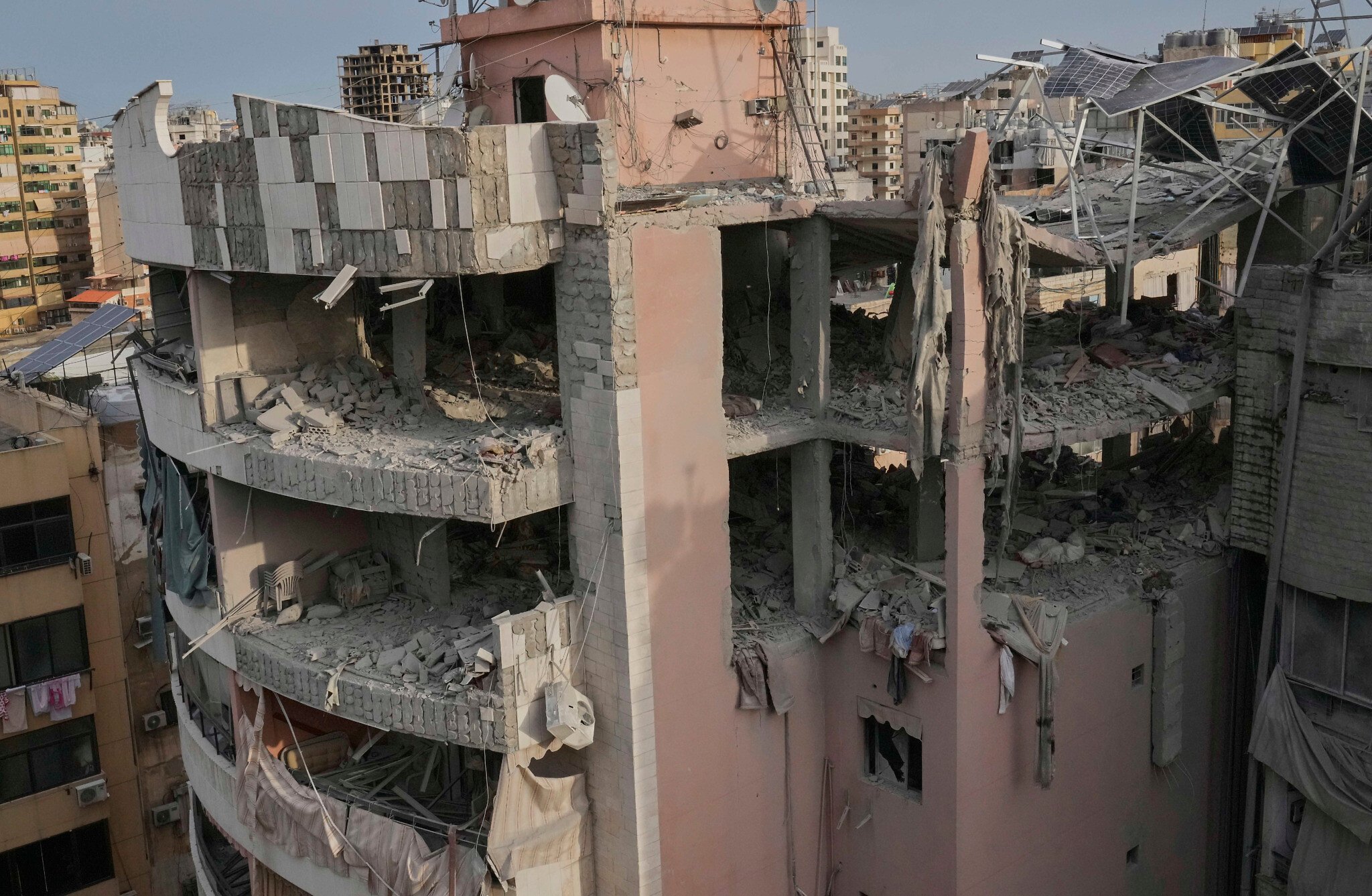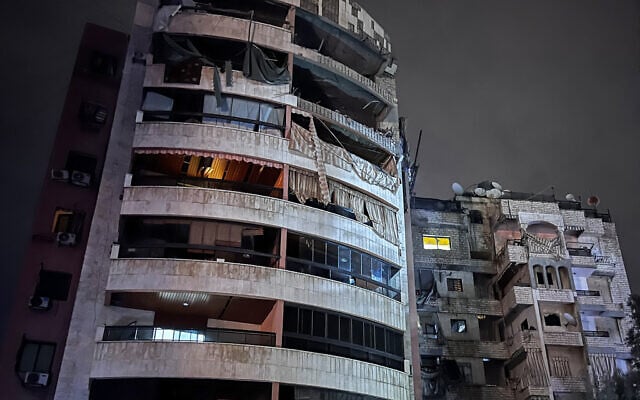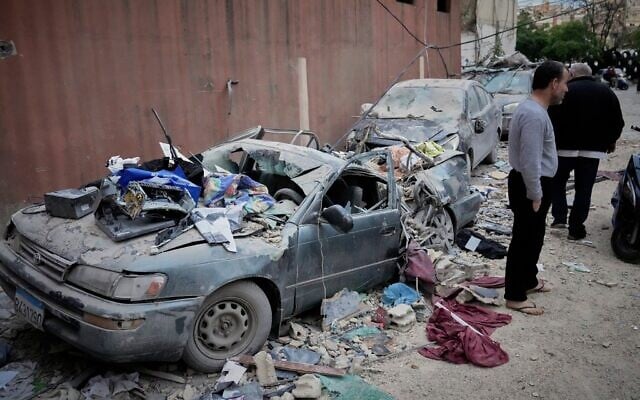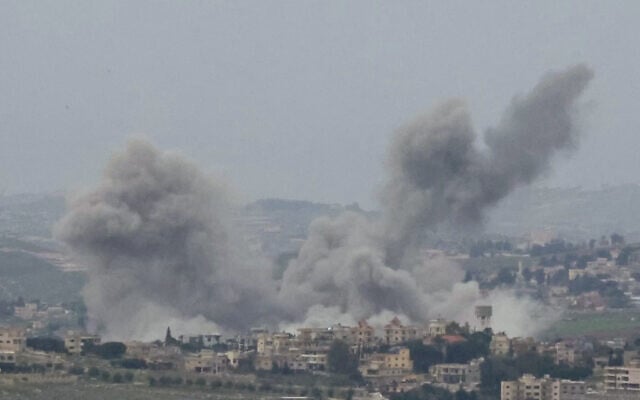



The Israel Defense Forces and Shin Bet said Tuesday that forces had struck a Hezbollah operative in Beirut who recently helped members of fellow Iran-backed terror group Hamas plan a “significant and imminent terror attack against Israeli civilians.”
According to Lebanon’s health ministry, three people were killed and seven wounded in the attack on Beirut’s southern Dahiyeh suburb, a Hezbollah stronghold. The United States expressed support for the strike, while Lebanon slammed it, with Lebanese President Joseph Aoun appearing to blame Hezbollah for provoking the attack, and a lawmaker for the terror group demanding the Lebanese state respond to the attack.
A source close to Hezbollah, who requested anonymity as they were not authorized to brief the media, was cited by the AFP news agency as saying the strike “targeted Hassan Bdair, Hezbollah’s deputy head for the Palestinian file,” who was “at home with his family” at the time.
It was unclear if the target was among those killed. The IDF was expected to provide further details on the target later.
It was Israel’s second attack on Beirut since the November 27 ceasefire that ended more than a year of war between Israel and Hezbollah. On Friday, the IDF struck Beirut after two rockets were fired at northern Israel. Hezbollah denied having launched the rockets. The truce deal gives Israel the right to act against imminent threats.
The Tuesday strike appeared to have damaged the upper three floors of a building in Beirut’s southern suburbs, a Reuters reporter at the scene said, with the balconies of those floors blown out. The glass on the floors below was intact, indicating a targeted strike. Ambulances were at the scene to recover casualties.
As opposed to the Friday attack, Tuesday’s strike was not preceded by evacuation orders from the IDF, according to witnesses, who said families fled in the aftermath of the strike to other parts of the Lebanese capital.
“We were at home. It was Eid al-Fitr,” said Hussein Nour El-Din, a resident in the neighborhood, referring to the Islamic holiday that marks the end of the holy month of Ramadan. “We didn’t know where it happened, but once the smoke cleared we saw it was the building facing us.”
In a statement via the Lebanese presidency’s X account, Aoun said the latest strike on Beirut was a “dangerous warning” that signals premeditated intentions against Lebanon.
The statement vowed to protect Lebanon’s sovereignty from foreign threats, “or from infiltrators within, who give additional pretext for aggression” — apparently a reference to Hezbollah.
Aoun, whose election in January ended a two-year impasse, has vowed to maintain a state monopoly on the right to bear arms — a thinly veiled threat against Hezbollah’s extensive arsenal.
Lebanese Prime Minister Nawaf Salam claimed in a statement issued by his office that the strike on south Beirut was a “clear breach” of the November ceasefire.
Salam also called the strike a “flagrant violation of United Nations Resolution 1701,” a Security Council decision that ended a 2006 war between Israel and Hezbollah and served as the foundation of the November truce.
However, that resolution — which barred Hezbollah from being present in southern Lebanon — was inadequately implemented, with the terror group maintaining a major military presence near Israel’s border over the years and allegedly planning its own invasion around the time of Hamas’s onslaught of October 7, 2023.
Speaking to journalists near the strike site, Hezbollah lawmaker Ibrahim Musawi said Lebanese authorities must “act with the highest level of effectiveness, make the international community bear its responsibility, and take the highest level of measures to guarantee the safety of the Lebanese.”
“What happened was a very big attack,” he added.
Meanwhile, a US State Department spokesperson said in an email to Reuters that Washington supported the Israeli attack, saying “hostilities have resumed because terrorists launched rockets into Israel from Lebanon.”
The US had also backed the Israeli strikes last week, calling on Beirut to do a better job of enforcing the ceasefire by ensuring the disarmament of all terror groups in Lebanon.
Israel has previously attacked other areas of Lebanon where it identified imminent threats by Hezbollah and affiliated terror groups. Hezbollah chief Naim Qassem said Saturday that if Lebanon’s government failed to stem the Israeli attack, Hezbollah would resort to “other alternatives.”
Unprovoked, Hezbollah began attacking northern Israel on a near-daily basis since October 8, 2023 — a day after fellow Iran-backed terror group Hamas led an invasion and onslaught in southern Israel in which some 1,200 people were killed and 251 were taken hostage, sparking the war in Gaza.
Under the November ceasefire, Hezbollah was obligated to pull its forces north of the Litani River, about 30 kilometers (18.6 miles) from the Israeli border, and dismantle any remaining military infrastructure in the south, while the Lebanese army deployed to control the area.
Israel, meanwhile, was obligated to withdraw its forces from southern Lebanon within 60 days. The withdrawal deadline was pushed off, with Lebanese and US approval, to February 18. Israel eventually withdrew from all of Lebanon except for five strategic posts along the border. While the White House has expressed support for the partial withdrawal, Beirut has called on Israel to withdraw from Lebanon entirely.
Emanuel Fabian contributed to this report.




